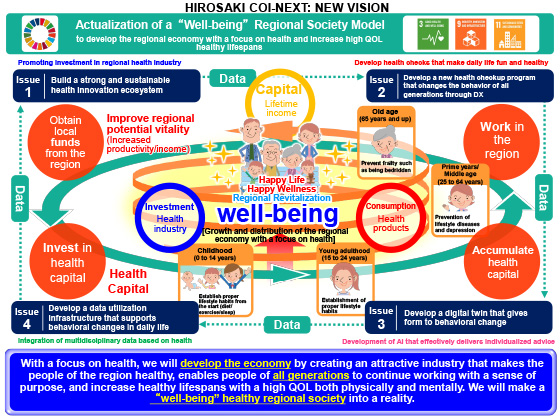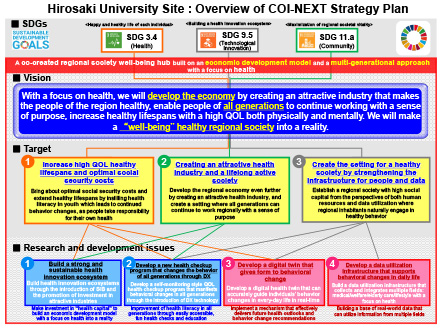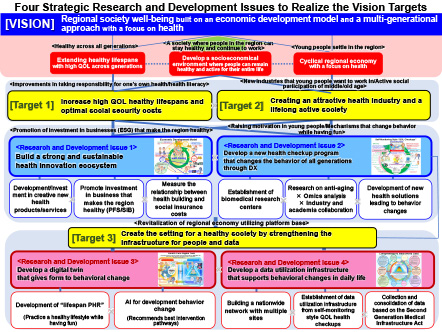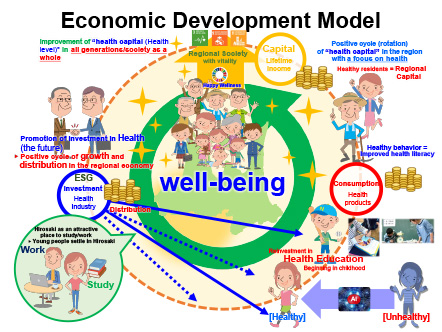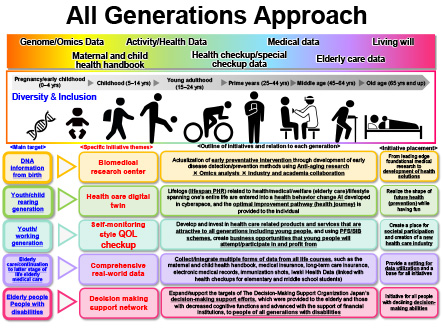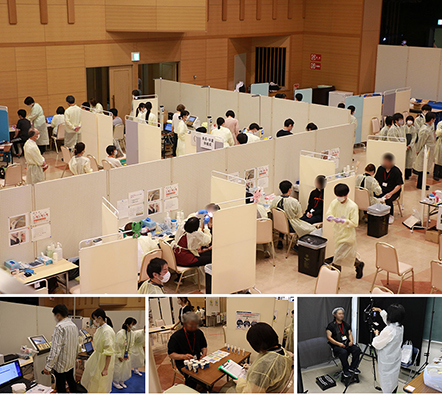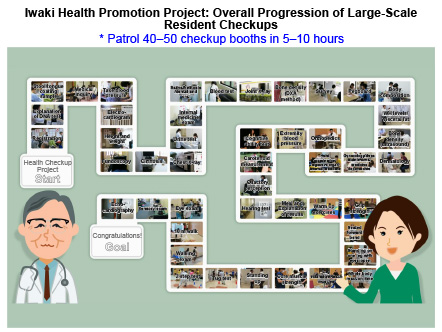Vision
Actualization of a “Well-being” Regional Society Model Centered on an “Economic Development Model” and “All generations Approach”
Hirosaki University is a site for the Program on Open Innovation Platforms for Industry-Academia Cooperation (COI-NEXT), a large-scale research support program run by the Ministry of Education, Culture, Sports, Science and Technology and the Japan Science and Technology Agency (JST). The site, named, “The Center of Well-being Regional Society Innovation, built on an economic development model and a multi-generational approach with a focus on health,” aims to actualize a healthy regional society model that increases healthy lifespans with mentally and physically high QOL and where people of all generations can continue working with purpose. This is to be accomplished by developing the economy through the creation of attractive industries that make the people of the region healthy. Our vision is, “with a focus on health, to develop the economy by creating an attractive industry that makes the people of the region healthy, enabling people of all generations to continue working with a sense of purpose. We will increase healthy lifespans with physically and mentally high QOL and will actualize a healthy regional society.” In order to accomplish our vision, we have set three targets and are working on four research topics.
Two key concepts in our strategy are “economic development model” and “all generations approach.” The “economic development model” aims for the actualization of a societal model that realizes not only mental and physical, but also financial well-being, by creating a positive cycle of “health capital.” This is accomplished by growing the regional economy by promoting investment in health and enabling the healthy residents to be the capital that supports a vibrant region. The aim of the “all generations approach” is the actualization of a community where healthy life expectancy with a high QOL is extended. By promoting health in business even further, people working in the region naturally acquire health literacy from a young age and can continue to work in good health until they are middle aged or elderly, and even the elderly can remain active and participate in community social events.
Background
The “Iwaki Health Promotion Project Health Checkup” to Solve the Societal Issues of “Low Life Expectancy” and “Childhood Obesity”
Japan has become a super-aging society. According to the Cabinet Office survey, the total population of those aged 65 years and above reached 29% in 2022, and it is expected to reach 33.3% in 2037, and 38.7% in 2070*1. Improving the health of the elderly and reducing medical costs have become major social issues. In particular, in addition to its aging population, Aomori Prefecture has high morbidity and mortality rates from age-related diseases and lifestyle-related diseases for people over 40 years of age, which greatly reduces the life expectancy of residents in the prefecture. According to the average life expectancy ranking by prefecture conducted every five years by the Ministry of Health, Labour and Welfare, the average life expectancy of Aomori Prefecture is the lowest in the country, and has been the lowest for men since 1985 and for women since 2000. Furthermore, the obesity trend among children in Aomori has become a serious issue. It was the worst in Japan in seven categories for both males and females between the ages of 5 and 17. *2
In 2005, Hirosaki University launched the “Iwaki Health Promotion Project Health Checkup” (hereinafter referred to as the Iwaki Health Checkup), a health promotion program for residents of the Iwaki district of Hirosaki City, to overcome this situation. Health checkups are carried out in a large community hall (community center) on 100 people a day, for a total of approximately 1,000 people, by around 300 medical staff, including doctors, for ten consecutive days. With roughly 50 health checkup stations set up each year, it is a large-scale event that starts early in the morning and takes an average of five to seven hours per person.
Even amid the COVID-19 pandemic, we devised implementation methods, took strict infection prevention measures, and continued to provide health checkups with the cooperation of residents. Another major feature is that the participating companies at the site utilize their respective expertise and strengths to measure specific items.
With an eye toward a post-pandemic society, COI-NEXT is building a system and network environment that enables reception, test progress management, and measurement record input based on two-dimensional barcodes, thereby reducing the amount of labor and increasing the efficiency of the entire health checkup process. In addition, we are constantly updating our measurement methods, including introducing a DX*3 health checkup system that reduces physical contact with participants (and thereby infection risks).
With our strong connection to and mutual trust with residents, we will continue to accumulate “big data on health.”
*1 Cabinet Office “Annual Report on the Aging Society FY2023”
*2 “School Health Statistics Survey Final Report (Aomori Prefecture FY2020)”


